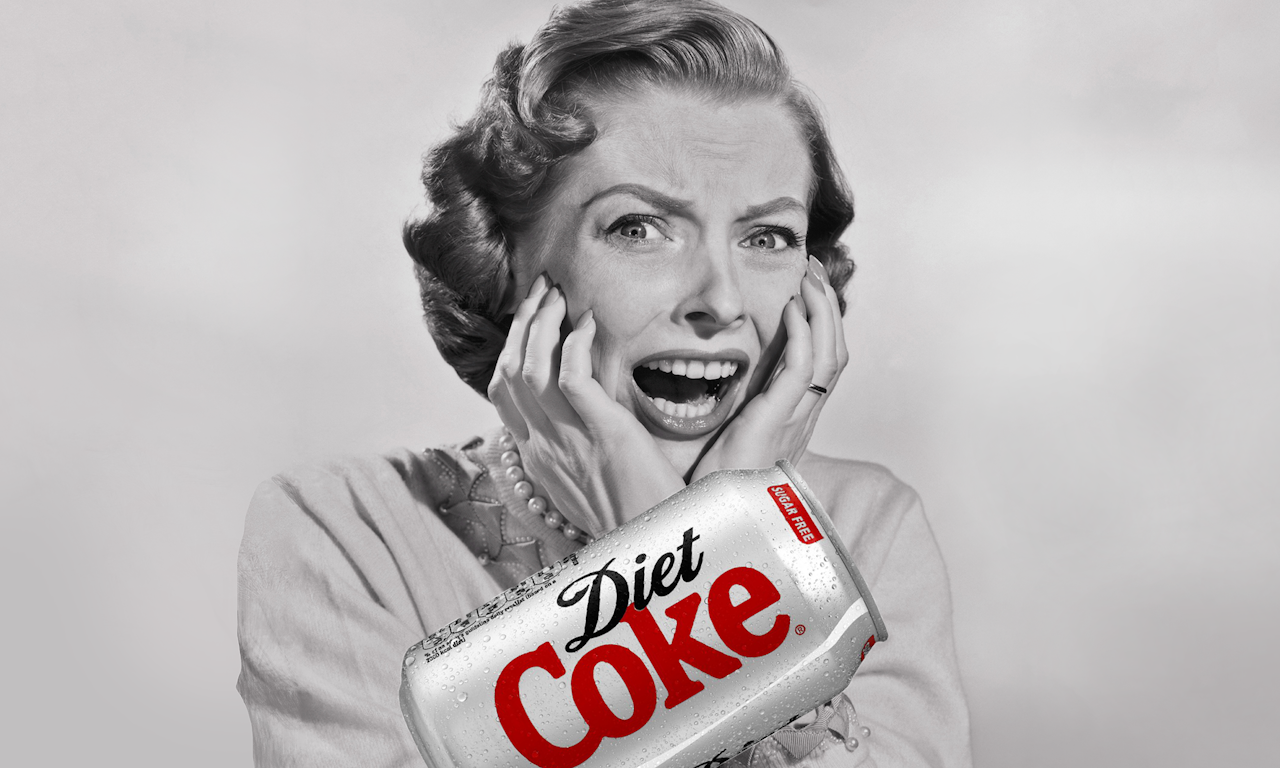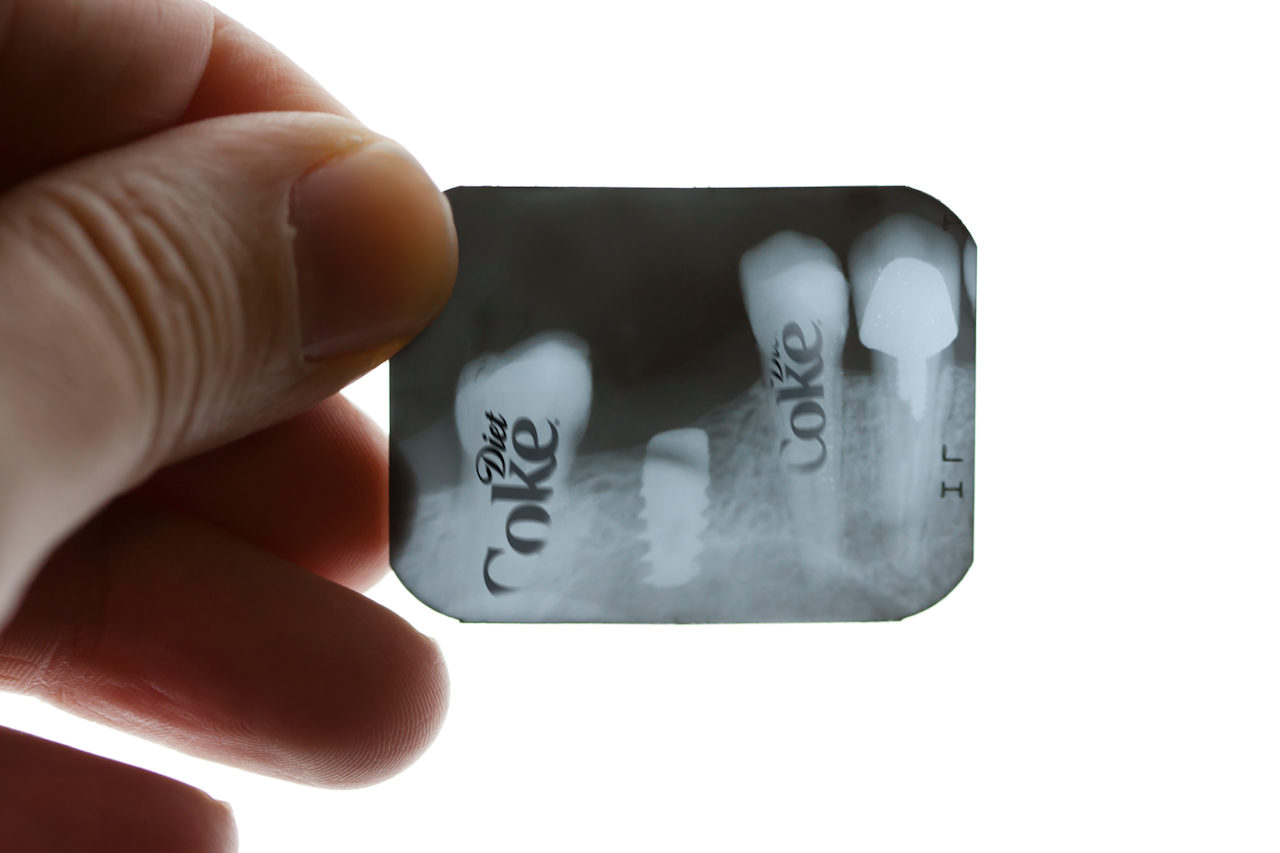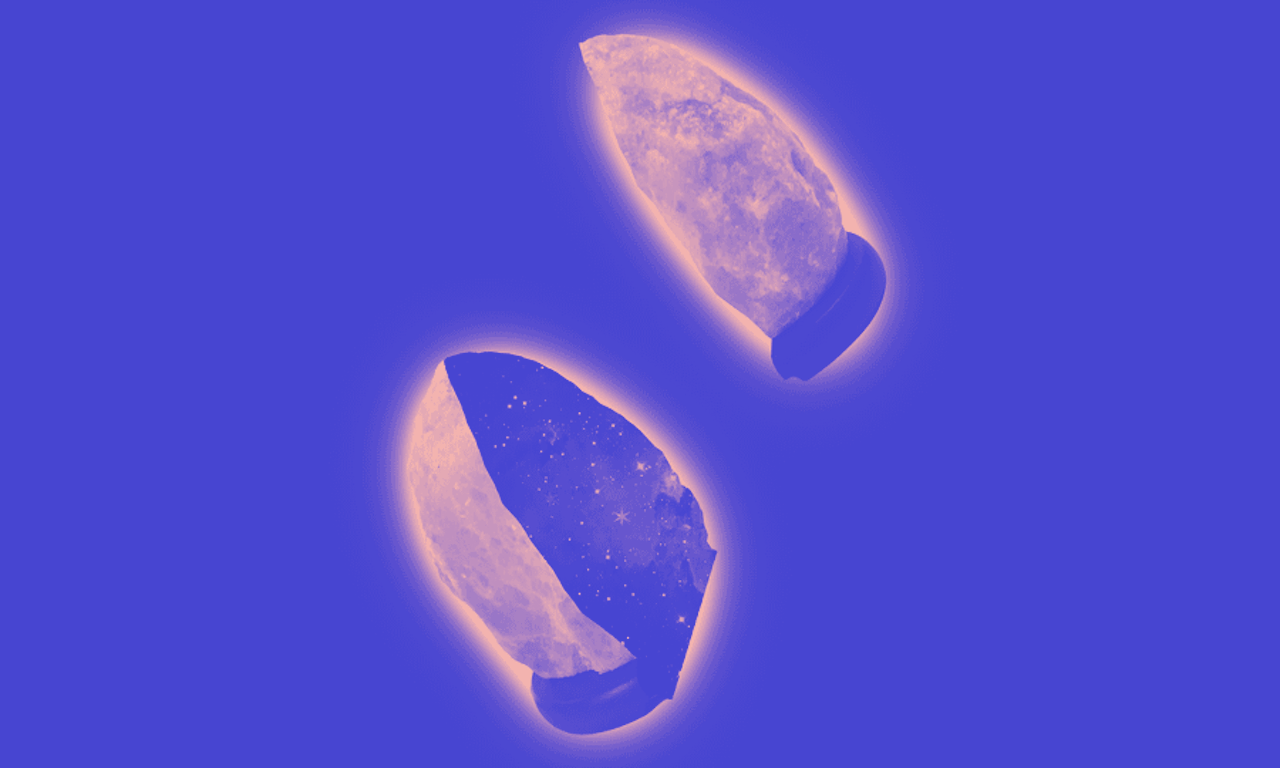As a time-honored Diet Coke lover, I’ve heard every reason why I should give up my delicious, crisp, delightfully caffeinated, aspartame-enriched beverage of choice: It’s giving me cancer. It’s as addictive as cocaine. It depletes nutrition from my body. According to a recent article in the New York Post, Diet Coke is definitely making me fat. If I give it up, my tastebuds will come to life, and my headaches will disappear. My bones will strengthen, and my attitude will even get better. My dog and my cat will start getting along. I’ll be able to hold warrior three, and I’ll finally understand why my most “spiritual” friends are addicted to Keeping Up With the Kardashians.
If there was any truth to these claims, I probably should have sprouted a third nipple by now. But I haven’t even gotten one of those mega-zits that the internet attributes to this magical, calorie-free elixir.
So what gives? What’s the truth, and what’s just a clickbait headline on a website with no scientific credibility?
Let’s have a look at the most common claims about Diet Coke’s toxicity and then decide if you can safely drink one with a 3,000-calorie mega meal.
Diet Coke deadens your taste buds
I’ve seen this one floating around on a few listicles and natural blogs: Diet Coke kills your sense of taste. Either by virtue of its acidity levels or the artificial sweeteners, some chemical mischief causes your taste buds to not be able to taste food as well anymore. And when you quit the evil demon Diet Coke, food tastes like gossamer whispers once again.
Too bad this isn’t even slightly true.
People have reported anecdotally upon giving up diet soda that “naturally” sweet things like fruit taste sweeter to them, but that’s exactly how far the evidence goes; an anecdote. No such study exists to prove this.
As for the claim that Diet Coke “deadens” your tastebuds, only a handful of things actually kill your tastebuds or cause changes to your ability to taste. Oral diseases and certain types of medicines are known tastebud killers. But the main cause of tastebud demise is time.
Your friend who’s convinced the apple tastes so much sweeter after they gave up Diet Coke? They need to research “the nocebo effect.”
Diet Coke causes cancer and multiple sclerosis
There is no way the magical chemical that makes Diet Coke taste sweet isn’t up to some biochemical mischief right now. We’ve all gotten the chain emails that say diet soda is causing tumors to pop up in rats and that it causes multiple sclerosis-like symptoms. Should you be worried?
No. The sweetener in Diet Coke, aspartame (also marketed as Nutrasweet® and Equal®), is one of the most extensively studied chemicals that’s ever been approved for the food supply. No link has ever been established between aspartame and cancer. At one point, there was some concern that aspartame was linked to an increase in certain types of cancers, but the increase began eight years before aspartame’s introduction to the market. This would be like blaming Obama for 9/11, and nobody sane would do that, right? All further testing has not shown any causal relationship between aspartame and cancer. Additionally, all new sweeteners go through more than a hundred safety studies, including cancer studies, before hitting the market.
And what about the MS claims? Good news: They’re full of shit, too. Both the National MS Society and Snopes have debunked the link between aspartame and MS. The National MS Society goes on to say that “no scientific evidence supports the claims that aspartame — an artificial sweetener used in many diet soft drinks and other foods — causes MS.”
Diet Coke causes tooth decay
You’ve heard the old urban legend (or at least the line in the musical Grease) that you can dissolve a tooth in some Coke, right? Or even that it’s as bad for your teeth as meth?
Of course the internet has proof that drinking diet cola destroys your teeth. There are blogs in which someone put a baby tooth that fell out into a bottle of Coca-Cola — the full-sugar formula — for nearly two months. They found that, indeed, when exposed to a liquid that’s a combination of sugar and a few different acids, the tooth decayed. There are also a few studies showing that, if you put a tooth into soda for two weeks, the enamel is worn down.
Think for a minute what the flaws in this experiment might be.
The conditions in which this tooth decayed are astronomically different from that in which a normal tooth is exposed to soda. First, this is just an experiment in vitro (i.e. a petri dish), with no controls and nothing in real-world settings to compare it to. No tooth was held for a similar amount of time in vitro in a solution of oral fluids and just periodically dosed with diet soda for two minutes followed by being brushed. Second, when you drink a Diet Coke, even if you have it daily, it’s not in your mouth 24/7. If you’re drinking one of the common serving sizes, a 12-ounce can or a 20-ounce bottle, it’s probably only actually touching your teeth for a few minutes at most. Odds are that you also brush your teeth, drink other fluids, and consume other foods. The environment that your tooth is in is changing regularly and being cleansed multiple times a day, and not sitting in one environment soaking constantly.
So yes, you can buy into scare tactics of poorly designed studies showing tooth enamel loss when a tooth is literally bathed in soda with zero oral care for more time in two weeks than your teeth will ever be in a lifetime. Or you can pick up a tooth brush at least twice a day and not worry about it. (Of course, without a proper oral hygiene routine, any acidic drink could contribute to oral decay, but singling out diet soda is falling prey to the natural fallacy.)
Diet Coke causes depression
Everything you eat seems to make some disease worse, right? Except, of course, kale.
So naturally, when I came across an infographic that said diet soda increased risk of depression by 30 percent, I shouldn’t have been surprised. Everything somehow makes you more likely to… something. Get a cold. Get cancer. Prefer DC over Marvel. Vote Republican.
In 2013, the American Academy of Neurology conducted a long-term population study on intake of beverages versus depression. The study’s 263,925 participants tracked their intake of various beverages for one year. Then, a decade later, they were asked to report any instances of depression over the course of the decade. A total of 11,311 were diagnosed and treated for depression at some point in the decade. This represents 4.3 percent of the people in the study, and diet soda was linked to a higher level of depression than coffee. From the variations reported 10 years earlier in beverage consumption, can we safely conclude that Diet Coke consumption causes depression?
Not a chance. The study has been criticized for many reasons, but mostly because no mechanism for causation of depression by ingredients in diet soda was ever proposed. Furthermore, the language in the study suggested that fruit punch was linked to a 38 percent increase in depression. The category of “fruit punch” included some beverages that used artificial sweeteners and some that didn’t, and they were relying on a quarter of a million people to feed them accurate data about their beverage intake with somewhat nebulous categories.
This is an example of correlation and causation gone horribly awry. To get their conclusions, researchers used reported intake of these beverages from 1995 to 1996 and then compared those numbers to rates of depression in the early 2000s. They didn’t closely track the participants’ food or beverage intake over the decade. They didn’t ask about traumatic life events. They didn’t ask, “Are you drinking diet soda because you’re trying to lose weight and depriving yourself of calories is a bummer?” It doesn’t appear that the study posed follow-up questions to its participants or regular questions on diet, and people’s diets change a lot over time.
And in a stunning move scientists refer to as p-hacking (i.e. making the data look the way you want it to by cherry picking the parts that look good), the researchers chose not to include approximately 30,000 cases of depression in their analysis because they felt these cases couldn’t be tied in with diet. Well, that’s strange. Doesn’t that also make the percentage of cases that are linked to diet look higher? And the bigger problem: There still isn’t any proof that any of these cases are tied into beverage consumption.
Given how poorly controlled all the data is from this study, it’s essentially useless for making any declarative statements.
Diet Coke causes diabetes
This is a pernicious one. The artificial sweetener in Diet Coke triggers something in your tongue so it thinks it’s tasting real sugar, setting forth an insulin response, tripping a mousetrap in your pancreas. Then a miracle happens and you have diabetes.
That’s not how any of this works.
In one 2009 study in the journal Diabetes Care, an association was found between diet sodas and diabetes or metabolic syndrome. But the authors of the study ultimately concluded that there was no causality between diet soda and the diabetic or pre-diabetic condition. In other words, it’s not the diet soda that’s causing people to have weight-related conditions. It might be that the person consuming the diet soda was already overweight, was trying to cut down calories starting with soda, and was still eating too much of something else.
Does aspartame and tasting something sweet trigger anything with insulin production? It doesn’t appear so. A 2010 review study from the British Journal of Nutrition analyzing a large body of evidence showed that, in vitro, artificial sweeteners could affect insulin levels. However, in humans there was no insulin response. Furthermore, a 1995 study from Physiology and Behavior showed evidence that the acts of tasting or ingesting artificial sweeteners will not cause an insulin spike.
A petri dish is good for some things, but replicating real-world dietary conditions is not one of them.
Diets are complicated, and people without proper training in nutrition are bad at preening an appropriate scientific understanding of one component of a diet and its relation to your overall health, metabolism, and insulin from a few articles alone. The media’s representation of studies doesn’t help any of this either. Because of our suspicion of chemicals, we’re quick to blame the zero-calorie beverage for diabetes instead of asking for a picture of someone’s metabolic balance. That would take more effort, but it’s much better science.
Diet Coke can clean rust off of a car
Pour Diet Coke on an old rusty fender. Wait a little while. Do a light brush off, and bam, fender is just like new! Diet Coke is almost certainly doing bad things to your internal organs then, right?
Let’s reverse that argument.
Anti-freeze will poison you if you drink it. Symptoms include convulsions, low blood pressure, blood in urine, blindness, coma, and possibly death.
If anti-freeze can do all of that to you, imagine what it’s doing to your car!
You’re not a car. This argument is fucking stupid.
Diet Coke makes you gain weight
This is my favorite argument, mainly because I drank Diet Coke all through my 90-pound weight loss.
How many times have you, my fellow Diet Coke lovers, been throwing back a can of crisp, refreshing brown sparkle juice, only to hear the following:
“That will make you gain more weight than regular Coke.”
I have two responses to this. The first is that I like the flavor, fuck you. The second response, to my well-intentioned-yet-entirely-wrong friends (regarding the laws of thermodynamics, at least) is that have you any idea how calories work?
Nope. Diet Coke does not make you gain more weight than regular Coke. Actually it probably won’t make you gain any weight. Anyone asserting otherwise has been confused by a pesky correlation.
“But what about all the headlines?” I hear you thinking at me very loudly. Those stories you read on the internet about studies that link diet soda to weight gain have not carefully tracked people’s diets, tested resting metabolic rate, or measured calories down to the last granule of sugar to find out if the Diet Coke was guilty.
And yet. We see articles, like this one in Time, that diet soda is linked to weight gain, but the article says right in it, “While the study doesn’t prove that diet drinks and artificial sweeteners cause weight gain, it certainly isn’t doing the trend any favors.”
Again — the articles that blame Diet Coke for weight gain typically cite studies in which people have not reported or counted calories and little is known about the rest of their diet. Basically, the only variable we know is that they drank diet soda.
When I was working as an analytical chemist, if I ever handed a study in which I only knew one out of the 17 variables that I set up for an experiment, my boss would have put my study through a shredder.
There has been one reputable study on Diet Coke and weight gain, by Carmen Piernas and the Global Food Research Program from UNC. In this study, scientists had regular soda drinkers switch to either water or three diet beverages per day. This was done as part of a weight-loss study. Both groups cut their overall caloric loads and made healthier choices, but perhaps most interesting to note? The diet soda drinkers opted to eat fewer desserts, maybe debunking the claim that diet soda makes people crave sweets.
Could it be that the sweet flavor of the diet sodas satiated their sweet tooths so they didn’t feel the need to eat dessert? Can we conclude, based on this study, that drinking only water makes you crave dessert? Maybe, but I���m not going to go there until more research is done.
The same pattern is true with the recent New York Post article. Though the piece cites an academic review article (i.e. an article that examines evidence from many studies), the evidence is wrought with bias, wildly flawed, and lacks any direct causal link to weight gain. Stacking up a dozen correlation studies still doesn’t mean there’s a causal link; just ask the anti-vaxxers. In the study the article is based on, from PLOS Medicine, the authors pick and choose which evidence to consider in their conclusion, ultimately saying that the “effect of ASBs (artificially sweetened beverages) on weight management has been tested in some randomized controlled trials (RCTs). These have produced mixed findings, with some studies indicating a null effect while others have found modest reductions in weight.” Though the authors claim that some studies produced a “null effect” on weight, the studies they cite suggest otherwise. One such study from the American Journal of Clinical Nutrition actually shows that diet soda had “effects similar to those of water,” and diets including diet soda showed a drop in systolic blood pressure of 10 to 15 percent.
Which leads me to ask: Did the authors even read this study before they shook their fists about diet soda being the devil’s candy?
Probably not, because their conclusion states that diet soda should “not be promoted as part of a healthy diet.” The Post’s headline declared that diet sodas “might actually be making you fatter,” which wasn’t the conclusion of the study at all, but we know how good people are about reading the entire story and not just the headline. As other experts have said, the study looks suspect. “The conclusion that reduced sugar or sugar-free drinks should not be promoted or seen as part of a healthy diet seems unwarranted and likely to add to public confusion,” Tom Sanders, a professor emeritus of nutrition and dietetics at King’s College of London, told The Telegraph. Alison Tedstone, the chief nutritionist at Public Health England, suggested that swapping artificially sweetened beverages for sugared ones "goes some way to managing calorie intake and weight.” But she added an important caveat: "Calories consumed should match calories used, so looking at the whole diet is very important."
Tedstone’s point is the most crucial one; you have to look at the entire plate. You can say, “I’m cutting back and getting a diet soda,” but if you’re still getting a quarter-ton mega-value meal, it’s still too many calories and diet soda is not the problem (unless you’re burning calories like Michael Phelps).
Please, just tell me what the deal is with Diet Coke.
It goes without saying (but I’m saying it): You should mainly be drinking water. But Diet Coke and all the other artificially sweetened beverages out there are not going to make you fat, give you cancer, or kill your tastebuds. Like so many other things in life, moderation is the key. You probably shouldn’t have too much of it, and if you want to swap it out for your morning coffee for your caffeine fix it’s not the end of the world… but if you’re swapping it out for your drink with lunch, dinner, and you’re opening a can every other hour, you might want to consider cutting back. And it’s not because Diet Coke is terrible for you but because water itself is pretty damn good for you.
Now if you’ll excuse me, I think I see that third nipple sprouting. Finally.
This piece has been updated to reflect the fact that any acidic drink, Diet Coke or otherwise, will contribute to oral decay.





